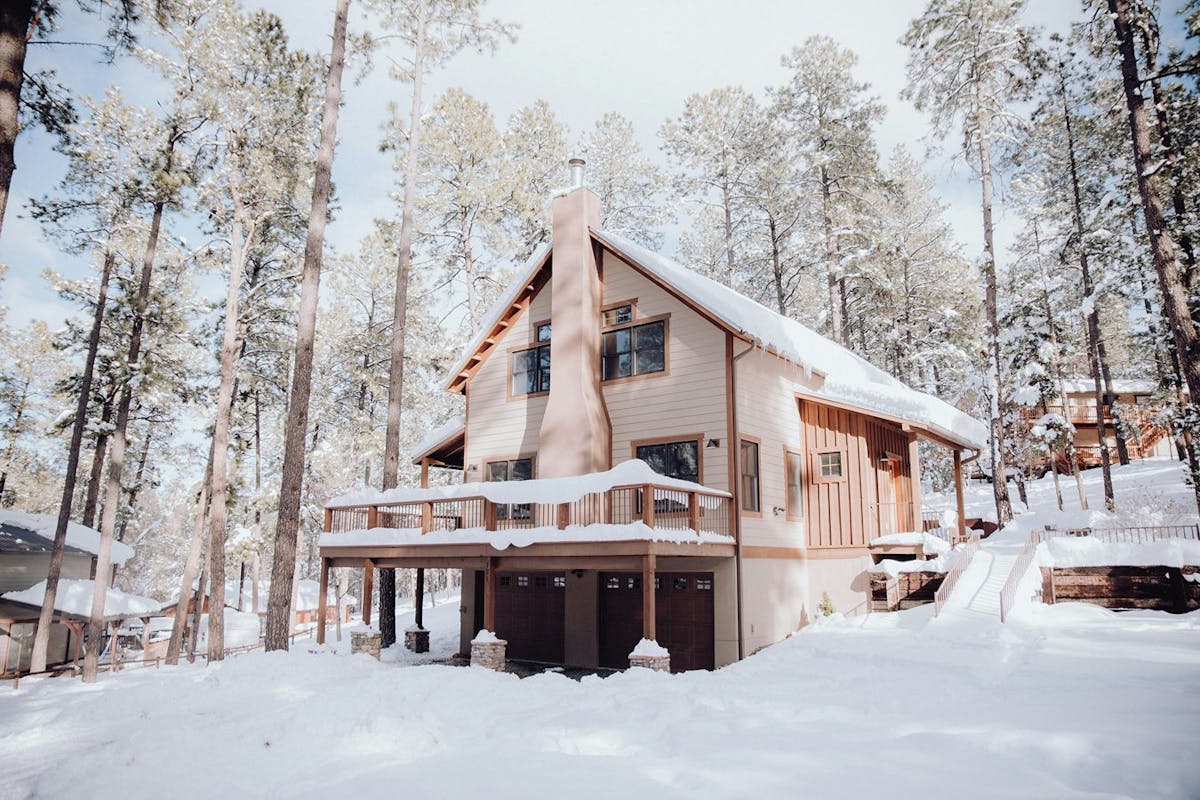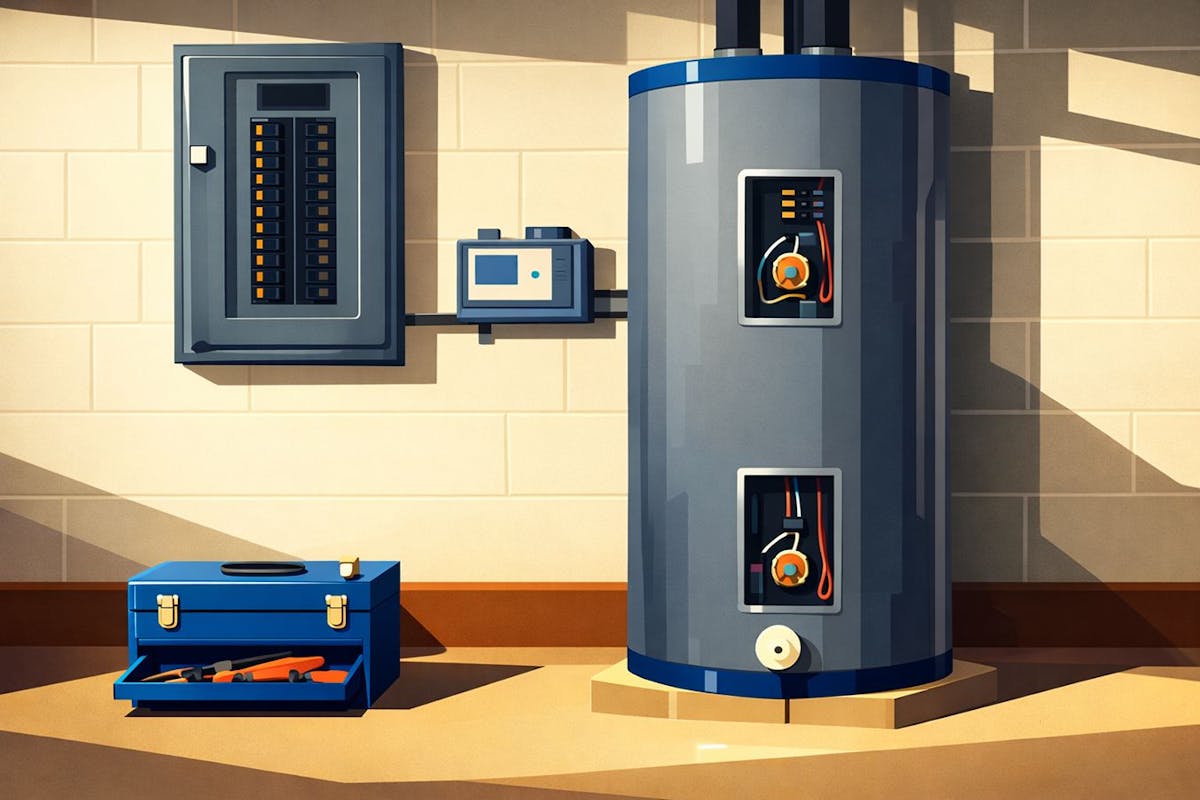Air Source vs. Geothermal Heat Pumps: Similarities, Differences, Benefits
Last edited
Author
Andrew Blok
Electrification and Solar Writer and Editor
Editor
Andrew Giermak
Solar and Electrification Writer and Editor

Heat pumps are the most efficient system for heating and cooling a home. Heat pumps can reduce bills for most Americans compared to other forms of home heating.
If you’ve heard of geothermal heat pumps but never considered one for your home, possible benefits include energy efficiency, long-term savings, reliability, and the probable lifespan. It’s worth looking at geothermal vs. air source heat pump heating and cooling for your home. The differences can have implications for your home’s energy efficiency and the installation and operation costs of the heat pump. Here’s what to know.
See how much you can save with a new HVAC system from Palmetto
How heat pumps work
Heat pumps move heat into or out of your home via a refrigerant which, when condensed or evaporated within a coil captures heat or releases it. In cooling mode it captures heat inside your home, and moves it outside, just like an air conditioner. In heating mode, it works in reverse.
Because heat pumps move heat rather than create it by burning a fuel or through electrical resistance, they’re more efficient than furnaces or baseboard electric heaters, which can near 100% efficiency. At that level of efficiency, you can get almost all the energy in a fuel source to turn into heat, but you can’t get more than exists in the fuel.
Air source heat pumps, since they’re only moving heat, can be effectively 300% efficient or more, moving three units of heat for every unit of electricity they consume. Geothermal heat pumps can be up to 600% efficient.
Air source heat pumps
Air source heat pumps move heat to or from the air outside your house. The refrigerant coil, where heat is absorbed or expelled, sits in a heat pump's outdoor unit, which looks a lot like an air conditioner's outdoor unit.
A large fan keeps air moving over the coil, which can expel heat into the air or absorb it, even down to really cold temperatures. Early heat pumps had trouble heating down to temperatures below freezing, but new cold climate heat pumps can operate at full efficiency well below that.
Geothermal heat pumps
Geothermal heat pumps, on the other hand, exchange heat with the ground (or sometimes water). Geothermal heat pumps, also called ground source heat pumps, also have a coil that exchanges heat with the outside world, but it doesn’t sit beside your house, it’s buried underground. The coil can be buried horizontally in a shallower field, about four feet below the ground, or vertically in wells about 100-400 feet deep, depending on the space available to you.
Below the surface, the temperature remains relatively constant: between about 40 and 70 degrees Fahrenheit. This makes the geothermal more energy efficient in really cold weather. While an air source heat pump might need to extract heat from sub-freezing air, a geothermal heat pump needs to extract it from 50-degree soil. That’s a much easier task.

A geothermal heat pump would only employ one of these loop systems. Both are shown here for illustrative purposes.
Geothermal vs. air source heat pump cost
Think about heat pump costs in two categories: installation and operation.
Installation costs
Air source heat pumps cost less to install than geothermal heat pumps. The main difference is what gets built outside your home.
Air source heat pumps have similar installation requirements to air conditioners and cost about the same to install, according to our survey of online consumer sources. Installation costs increase with the size of the heat pump and the home and the required efficiency and performance specifications. Common estimates range from $4,500-$25,000.
Geothermal heat pumps cost more to install, because you must dig a trench or well to install the underground loop. Geothermal heat pump installation costs are commonly estimated between $8,000 and $30,000. While that’s an additional expense during geothermal vs. heat pump installation, it pays off when it comes to operating costs.
Heat pump leasing offers a model that avoids the upfront cost of purchase and installation. Instead, with a lease such as Palmetto's Comfort Plan, you pay a flat monthly fee over the lifetime of the lease and get the heat pump at your home and any maintenance and repair costs included.
Operating costs
Because soil temperatures are typically warmer than air temperatures in the winter and cooler in the summer, geothermal heat pumps are more efficient than air source models. The relatively constant and advantageous underground temperature means geothermal heat pumps can reduce energy use 25-50% compared to air source ones, according to the Department of Energy. That can lead to significant savings.
Energy Star-rated geothermal heat pumps can use 61% less energy than standard models and save $830 a year. The Department of Energy found that, not only could geothermal heat pumps reduce energy bills, they could reduce the need to build transmission lines, a notoriously difficult task in recent years.
Lifespan
How long does a heat pump last? It depends (a little bit) on what kind you’re talking about.
A new air source heat pump is expected to last 15-25 years. Geothermal heat pumps can last 20-25 years, and their underground loops can last 50.
See how much you can save with a new HVAC system from Palmetto
Space requirements
An air source heat pump has the same requirements as an air conditioner. Whether it’s a central or mini-split heat pump, you need room outside to install the outdoor unit(s) somewhere near your house.
A geothermal heat pump needs room to bury the underground coil. For many buildings, that includes digging a wide trench to bury a horizontal coil. In other places where space is at a premium, the underground coil can be buried in a vertical well. This reduces the space needed, though it will still likely require more than an air source heat pump.
Heat pump incentives
Both air source and geothermal heat pumps qualify for tax incentives, though slightly different ones.
People who buy and install an air source heat pump can claim the Energy Efficient Home Improvement Credit, which allows for a credit of 30% of the heat pump’s cost up to $2,000.
Geothermal heat pumps qualify for the Residential Clean Energy Credit, which allows for tax credits worth 30% the heat pump’s cost with no dollar limit. They must be Energy Star-rated to qualify.
Both tax credits expire at the end of 2025, though state-led heat pump rebates may be available beyond then.
Confirm your eligibility with a tax professional before counting on a tax credit, since everyone’s tax situation is different.
As tax credits expire, HVAC leasing — like with Palmetto’s Comfort Plan — offers an affordable and accessible way to get the best heating and cooling solution for your home. Explore your options for an HVAC system that’ll keep you comfortable all year long.
Air source vs. geothermal heat pumps
| Air Source Heat Pumps | Geothermal Heat Pumps |
|---|---|
| Efficient | Most efficient |
| Can cut energy bills | Can cut energy bills even more |
| $4,500-$25,000 installation cost | $8,000-$30,000 installation cost |
| No special space requirement | Need room for underground coil |
| Tax credit through 2025 (30% or $2,000) | Tax credit through 2025 (30%, no dollar limit) |
| 15-25 years | 20-25 years (50 years for underground coil) |
See if a heat pump works for your home
While both air source and geothermal heat pumps are highly efficient and can significantly reduce energy bills, they differ in key areas like installation cost, long-term savings, and space requirements. Air source heat pumps are more affordable to install and have lower space requirements, making them a great option for many homeowners.
Geothermal systems, while more expensive to install, offer greater efficiency that can lead to substantial long-term savings. The best choice for you will depend on your specific circumstances, including your budget, available space, and the climate you live in.
Explore your potential heat pump savings by putting your address and energy into Palmetto’s HVAC advisor.You can track your current energy usage and see potential ways to save, including on your heating and cooling, with the new Palmetto app.
See how much you can save with a new HVAC system from Palmetto
Frequently asked questions
Do heat pumps need maintenance?
Yes. air source and geothermal heat pumps, like other HVAC equipment, benefit from regular maintenance. That includes regular visits from an HVAC technician, and do-it-yourself tasks, like changing air filters. Regular heat pump maintenance can keep your system running efficiently and for years to come.
Why are heat pumps so efficient?
Instead of creating heat by burning a fuel, they just move heat into or out of your house. Their real efficiency advantage is when they’re in heating mode, where they can be more than three times as efficient as furnaces and electric resistance heating.
Lead image by Bailey Alexander on Unsplash


